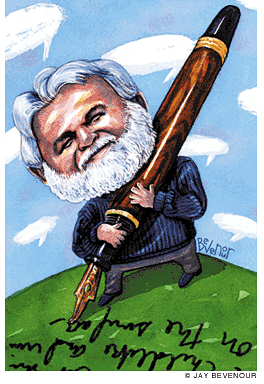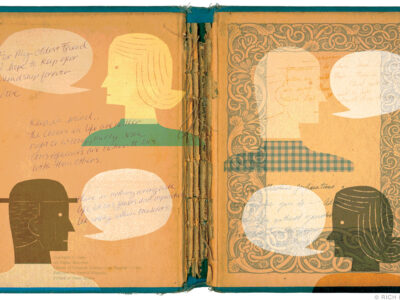
Before reading from his latest novel, The Darling, Russell Banks told an audience at the Kelly Writers House that he was still “kind of tinkering” with the prose. Banks fans might find scant space for improvement in such characterizations as: “She’s a drug-free, home-schooled, vegan virgin from Vermont, childlike and winsome on the surface, but on the inside tight as a fist.” The writer, however, admitted that he never felt he had “a great fluency or natural gift. I think partially because of my … Protestant working-class New England background, I mistrusted language and felt inept and inadequate [around it].”
What the author of Cloudsplitter, Rule of the Bone, The Sweet Hereafter, and Affliction does possess is “a great yearning to try to make my stories connect to the larger world, to the larger issues that concern me personally,” he said. “And so I found that essentially the only way I could overcome my own lack of fluency, my own intellectual ineptitude, is to trust the process, the process of writing.”
One of three Writers House Fellows for 2004 (along with Lyn Hejinian and James Alan McPherson), Banks spent two days here in February, sharing within these intimate quarters how “the process” works for him. In addition to his evening reading—from a novel set partly in Liberia and partly on the upstate New York farm of a former sixties activist—he met with undergraduates taking the Writers House Fellows Seminar. The next morning he took part in a brunch and question-and-answer session moderated by Writers House faculty master Al Filreis.
Among other topics, he talked about truth and fact in historical fiction. “Anything I read in the newspapers, anything told to me in a bar by a drunk, or even a sober person … anything I dream, to me all of this exists on the same plane of availability for fiction,” he said. “The main question for me with regard to using historical material is plausibility.”
In writing Cloudsplitter, based on abolitionist John Brown, Banks kept the main facts in order while changing a few details that weren’t part of the general public’s knowledge. This drew the ire of some historians.
“There was an early passage in the novel when Brown’s family goes up into the Adirondacks and crosses along the Cascade lakes, which are described as shaped like a scimitar. I wanted the image in there because it’s a huge event later in the book when they use swords to butcher pro-slavery families in Kansas. [The local historian] calls me up. Her name was Ms. McKenzie.”
“She said, ‘The road didn’t go there in 1848.’”
“I said, ‘I know.’”
“She said, ‘You know? But that road didn’t go there in 1848.’”
“And I said, ‘I don’t care, Ms. McKenzie.’”
Most authors do care, however, about creating realistic characters. Banks seemed touched when one reader at the session told him, “Your characters seem so real, and I was wondering if you feel … there’s a future for your characters outside of your books.”
“Yes. Sometimes I like to think they’re all living in a commune in New Hampshire, a really dysfunctional place,” he joked. “It is true that certain characters in my mind live on—they’re the young ones [whose] destinies haven’t been worked out yet. I don’t think I’ll ever revisit them and find out [what happened], but I do miss them.”
—S.F.




